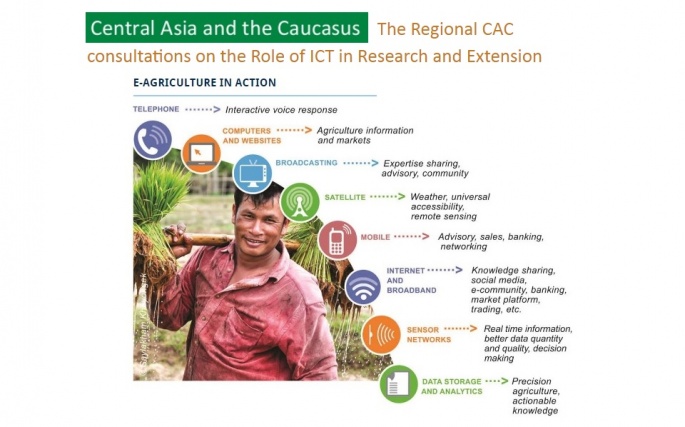Knowledge is power. First impressions on e-agriculture


(Image credit: E-Agriculture Strategy Guide, the FAO of the United Nations)
The Regional Central Asia and the Caucasus (CAC) multi-stakeholders consultations on the role of ICT in agricultural research and extension towards more sustainable agri-food system took place in Bishkek, Kyrgyz Republic, on 7-9 December, 2016. Participants discussed the role of ICT solutions, technology, multidisciplinary and integrated approaches and policy options (from ICARDA, FAO, ITU, CACAARI, CAC-FRAS) for enhancing agro-ecosystem.
____________________________________________________________________________________________________
Innovation is a process where different participants gather knowledge to create value...
Apparently, this sentence best describes the first day of the regional expert consultations on e-agriculture in Central Asia and the Caucasus (CAC). It has been also clarified that innovation is an existing or new product, process or form of organization that brings economic, social and environmental benefits and can generate a significant change.
Application of innovative ways to use information and communication technologies (ICTs) in the rural domain, with a primary focus on agriculture, gives rise to the concept of electronic agriculture (or e-agriculture). It is not just another common tool to reach sustainable development goals (SDG), but rather unique approach, focusing primarily on enhancing information and communication processes in favor of improving agriculture and rural areas, which is extremely demanded nowadays.
Needless to say that a few decades ago, virtual communication, community and reality as a whole was considered as an absurd phenomenon accepted mostly skeptical which goes beyond understanding. Now, it is a common thing, accepted by everybody.
The same scenario is applicable to e-agriculture: perhaps now we cannot imagine how we can apply the benefits on a larger scale, but tomorrow it will become the most practical and effective communicative technique, which will sufficiently influence directly or in some cases indirectly on the global challenges of food security, environment, energy sources and urbanization.
Many might have a question: Why should farmers choose exactly e-agriculture?
The most obvious reason is that it enables farmers to get access to information and avoid being isolated. The fact that a person is alone with his/her local agricultural issues is a terrible feeling, however, the availability of modern technological and innovational progress completely compensates this.
Vivid and active regional consultations serve as a proof in this instance. Experts of CAC countries were happy to speak about their progressive outcomes of using e-agriculture and ICT on a national level. What is more important, they were excited on receiving the informational and knowledge breakthroughs from colleagues of other CAC countries and international organizations, e.g. FAO.
At the moment, there is a huge number of diverse small scale e-agriculture applications restricted for a local use. This fact is leading to inability to communicate and share data in a global scale. Nevertheless, there is a sustained belief that currently running regional expert consultations for CAC can at least resolve this major issue on a regional basis. In other words, the first and the hardest step, which is establishing a connection between diverse stakeholders can be considered as an accomplished mission of FAO, CACAARI and CAC-FRAS.
To be continued…
Our sincerest thanks for this contribution to:
Country: | Uzbekistan |
Affiliation: | |
Working on: | facilitating CAC regional cooperation in agricultural research for development |
Twitter account page: |

